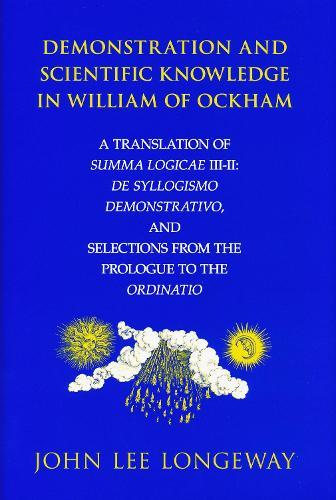Overview
This book makes available for the first time an English translation of William Ockham's work on Aristotle's Posterior Analytics, which contains his theory of scientific demonstration and philosophy of science. John Lee Longeway also includes an extensive commentary and a detailed history of the intellectual background to Ockham's work in the Latin Middle Ages. Longeway puts Ockham into context by providing a scholarly account of the reception and study of the Posterior Analytics in the Latin Middle Ages, with a detailed discussion of Robert Grosseteste, Albert the Great, Thomas Aquinas, Duns Scotus, and Giles of Rome. In a series of appendices, Longeway includes shorter translations of some important related work by Giles of Rome and John of Cornwall. In his introductory discussion, Longeway examines the exact character of the highest sort of demonstration (demonstratio potissima), the relations of the empirical sciences to mathematics, natural causation and the manner in which natural laws come to be known, the possibility of natural knowledge, our knowledge of God, and the relation of theology to the other sciences. Longeway discusses the way in which scientific epistemology and theory of demonstration corresponds to the metaphysical position of its interpreter, in particular to the Neoplatonism of Grosseteste, the radical Aristotelianism of Giles of Rome and Albert the Great, the more moderate Aristotelianism of Aquinas, and the nominalistic empiricism of Ockham. Throughout the book, Longeway makes a case for Ockham's importance as the founder of Empiricism in the West. Demonstration and Scientific Knowledge in William of Ockham will interest philosophers and historians of science and logic, as well as those who study medieval philosophy or early modern philosophy.
Full Product Details
Author: John Lee Longeway
Publisher: University of Notre Dame Press
Imprint: University of Notre Dame Press
Dimensions:
Width: 15.60cm
, Height: 2.50cm
, Length: 23.40cm
Weight: 0.811kg
ISBN: 9780268033781
ISBN 10: 0268033781
Pages: 277
Publication Date: 15 January 2007
Audience:
College/higher education
,
Professional and scholarly
,
Undergraduate
,
Postgraduate, Research & Scholarly
Format: Hardback
Publisher's Status: Active
Availability: In Print

This item will be ordered in for you from one of our suppliers. Upon receipt, we will promptly dispatch it out to you. For in store availability, please contact us.
Reviews
Longeway's claims are well-considered, and Ockham's influence on early modern philosophy is never far from his mind. His careful translation, compilation of relevant documents, and impressive history of medieval empiricism should interest any scholar studying the history of philosophy of science. -Journal of the History of Philosophy Longeway provides not only a very accessible translation but also extensive commentary of his own, including a book-length detailed history of the intellectual contexts of Ockham's Latin Middle Ages. . . . The result is an effective translation of Ockham's seminal work but also what may become a foundational text in intellectual and science history. -Research Book News The present work is the result of decades of study of Ockham's philosophy of science. The translation and commentary are introduced by a chapter in which Longeway presents an overview of Ockham's thought in this area and highlights its philosophical significance. This introduction is in its own right a significant contribution to the history of philosophy. -Owen Goldin, Marquette University Like much else in medieval philosophy, medieval theories of demonstrative knowledge are historically important, philosophically interesting, and little understood. There are a few extensive studies into medieval discussions of demonstration and even fewer translations of these important discussions. Longeway's translation of Ockham in Demonstration and Scientific Knowledge in William of Ockham is among the few English translations of medieval commentaries on posterior analytics we have and in this way is an important contribution to the field. Longeway's lengthy introductory survey both introduces readers to the development of medieval discussion of Posterior analytics prior to Ockham and situates (historically and philosophically) Ockham's discussion within that development. These translations will be of value to scholars working on a variety of areas on Ockham's thought as well as to scholars interested more generally in medieval theories of demonstration, science, and epistemology. -Susan Brower-Toland, Saint Louis University
The present work is the result of decades of study of Ockham's philosophy of science. The translation and commentary are introduced by a chapter in which Longeway presents an overview of Ockham's thought in this area and highlights its philosophical significance. This introduction is in its own right a significant contribution to the history of philosophy. - Owen Goldin, Marquette University
Longeway's claims are well-considered, and Ockham's influence on early modern philosophy is never far from his mind. His careful translation, compilation of relevant documents, and impressive history of medieval empiricism should interest any scholar studying the history of philosophy of science. -- Journal of the History of Philosophy
Author Information
John Lee Longeway is associate professor at University of Wisconsin, Parkside. He is the author of William Heytesbury: On Maxima and Minima.



